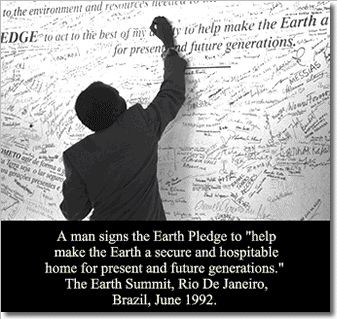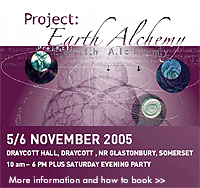Scientists Call for Humans to Clean Up Their Act -The Rio Affidavit
Is humanity on a collision course with environmental disaster, industrial collapse and social chaos? As you will read below, it surely seems so. This is hard evidence that humans are in bondage, blindly living the lie.
This "head in the sand" attitude has caused considerable damage to the environment. You and I were put on the planet as caretakers. All we have done is taken and not cared.
Before the Rio Earth Summit of 1992, 1500 world scientists including 50 Nobel Prize winners, signed an affidavit warning humanity of the likely outcome of our current practices upon the environment. In it they said, "Human beings and the natural world are on a collision course. Human activities inflict harsh and often irreversible damage on the environment and on critical resources. If not checked, many of our current practices put at serious risk the future that we wish for human society and the plant and animal kingdoms, and may so alter the living world that it will be unable to sustain life in the manner that we know. Fundamental changes are urgent if we are to avoid the collision our present course will bring about."
|
|
|
They noted dangerous changes to the atmosphere including ozone depletion, pollution and acid precipitation. Our water supply is being depleted and polluted. Ocean fishing is at or above the maximum sustainable yield. Rivers carry soil plus industrial, municipal, agricultural and livestock waste into the oceans which, as a result, are becoming increasingly polluted. Our soils and our produce lack nutritional minerals. Much formerly farmable land is now unusable. Tropical rain forests with all their diverse species of life and oxygen production capacity are being destroyed at a rapid rate. By 2100, it is estimated that we will have permanently lost as much as one-third of all species of life on the planet.
Many of these changes will take centuries to correct or are already irreversible. Global warming is likely to occur as a result of increased carbon dioxide levels produced by the burning of fuels and rainforests. This may change the world climate drastically. Loss of species may cause the collapse of critical biological systems with disastrous results for the whole planet. Life as we know it on earth may become unsupportable.
Unrestrained population growth is putting further pressures upon the environment. If unchecked, a sustainable future for humanity will be impossible. The earth, its ability to absorb wastes, its ability to produce food, all its resources are finite. If we are to halt the destruction to the environment, we must limit population. We have no other choice.
No more than a few decades remain for us to reverse these trends "if vast human misery is to be avoided and our global home on this planet is not to be irretrievably mutilated."
They do offer a solution. It involves five areas:
1. We must bring environmentally damaging activities under control to restore and protect the integrity of the earth's systems we depend on. (They recommend the development of small scale, non-polluting, inexhaustible energy sources. And they recommend halting deforestation, loss of agricultural land and species of life.)
2. We must manage resources crucial to human welfare more effectively. We must give high priority to efficient use of energy, water, and other materials, including expansion of conservation and recycling.
3. We must stabilise population. This will be possible only if all nations recognise that it requires improved social and economic conditions, and the adoption of effective, voluntary family planning.
4. We must reduce and eventually eliminate poverty.
5. We must ensure sexual equality, and guarantee women control over their own reproductive decisions.
Since the industrialised nations pollute most per capita, they have the highest responsibility to curb their excesses. Since they have the finances and technology to fight these issues and assist the developing nations, the greater burden of responsibility is upon them. Continuing to earn profit at the expense of the future of our earth in not tenable.
They continue:
"Acting on this recognition is not altruism, but enlightened self-interest: whether industrialised or not, we all have but one lifeboat. No nation can escape from injury when global biological systems are damaged. No nation can escape from conflicts over increasingly scarce resources. In addition, environmental and economic instabilities will cause mass migrations with incalculable consequences for developed and undeveloped nations alike.
"Developing nations must realise that environmental damage is one of the gravest threats they face, and that attempts to blunt it will be overwhelmed if their populations go unchecked. The greatest peril is to become trapped in spirals of environmental decline, poverty, and unrest, leading to social, economic and environmental collapse.
"Success in this global endeavour will require a great reduction in violence and war. Resources now devoted to the preparation and conduct of war-amounting to over $1 trillion annually-will be badly needed in the new tasks and should be diverted to the new challenges.
"A new ethic is required-a new attitude towards discharging our responsibility for caring for ourselves and for the earth. We must recognise the earth's limited capacity to provide for us. We must recognise its fragility. We must no longer allow it to be ravaged. This ethic must motivate a great movement, convince reluctant leaders and reluctant governments and reluctant peoples themselves to effect the needed changes...
"We call on all to join us in this task."
They stated the case of our world very succinctly and clearly. What has been the result?
At the Rio summit, it was agreed that the rich industrialised nations would double their spending on development assistance. This was agreed to be a vital factor for improving world environmental conditions. The other most important factor that they agreed to address was a change in energy policy to significantly reduce carbon dioxide production. Five years later, they had done neither. The industrialised nations failed utterly to keep their agreements. In fact, their spending upon development assistance had fallen by 20-25%!
Per person, the United States consumes the most energy and pollutes the most of any country in the world. Thus they have the greatest responsibility to clean up their act. However, again and again, the United States has blocked international action to reduce carbon monoxide emissions, claiming that it would interfere with industrial productivity. It seems that United States government is still following the path of comfort, profit and greed.
Organisations like Greenpeace work continually to bring these issues to the news and thereby into public awareness. Whether the governments of the industrialised nations will realise the danger and act soon enough to avoid environmental collapse and the consequent collapse of civilisation as we know it is still unknown. We may well be heading for a new kind of dark ages with mass starvation, collapse of industry, plagues, looting and collapse of governments. If the dark predictions become reality, survival will depend upon doing what the Hopi's recommend: Where is your water? Know your garden. Create your community. Be good to each other.\
Will we allow ourselves to enter even more deeply into bondage or will we awake and preserve life on earth?
Project: Earth Alchemy intends to show 'everyman' how to wake up to the bigger picture and heal it.

|
|
|
|


